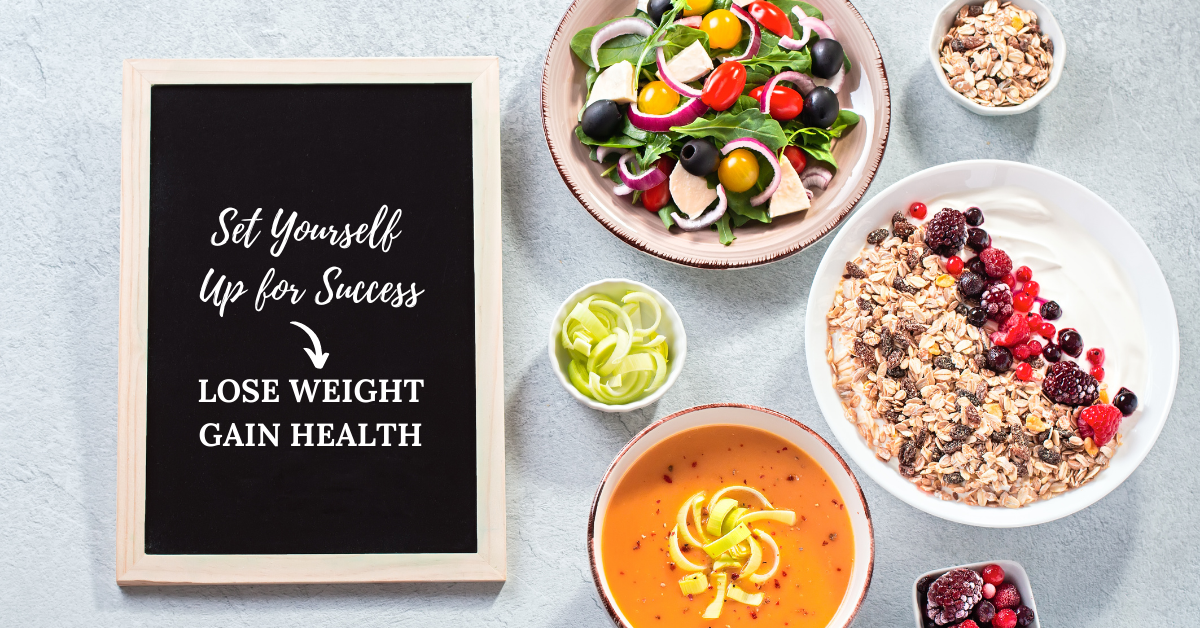From fad diets to the latest detox, it’s been well established that there are no “quick fixes” or ‘miracle diets” when it comes to weight loss. However, there are simple changes that you can make to your nutrition and lifestyle habits that can result in significant health benefits and produce the weight loss results that you want. Try implementing these seven simple strategies into your daily routine that can help you lose weight and improve your health.
Increase Fiber Intake
Fiber has many health benefits. Not only can fiber promote weight loss, but it can also improve your digestive health, skin health, heart health and improve blood sugar control. Fiber is found in plant foods we eat like fruits, vegetables, grains and legumes. There are two types of fiber which are soluble fiber and insoluble fiber.
Soluble fiber is a natural appetite suppressant. By suppressing your appetite, you are more likely to reduce your calorie intake helping you to lose weight. Another incentive to increase soluble fiber intake is that higher intakes has been linked to having a lower risk of abdominal fat and may actually help you reduce abdominal fat.
The recommended daily fiber intake is 25-30 grams per day, unfortunately, most Americans only consume around 15 grams per day. In order to reduce unwanted side effects such as gas, abdominal bloating and diarrhea, gradually increase fiber into your daily intake and make sure to consume adequate water daily.
Foods high in soluble fiber include:
- Flaxseed
- Sweet Potatoes
- Oatmeal
- Apricots
- Raspberries
- Apples
- Figs
- Broccoli
Eat Adequate Protein
Protein is an important building block for bones, muscles, skin, cartilage and blood. Your body uses protein to build and repair tissues. Protein is also used to make hormones, enzymes and other important body chemicals. Most people eat enough protein to prevent deficiency, but some individuals may benefit from a higher protein intake depending on your activity level and goals.
Protein is more filling than carbohydrates and takes more energy for you to digest than refined carbohydrates. Protein reduces your level of hunger hormone and boost hormone levels that help you to feel full.
Some research suggests that eating a high protein breakfast can have a significant impact on reducing night cravings. Eating more protein may also give your metabolism a boost and help you burn more calories throughout the day.
Excellent sources of protein include:
- Beans
- Lean Meats
- Legumes
- Nuts
- Seeds
- Greek Yogurt
- Tofu
- Tempeh
Switch to Healthier Swaps
Drinking sodas and other sugary beverages has been associated with negative health effects and increased risk for obesity, diabetes, fatty liver, and metabolic syndrome. Diet drinks are not good options due to the potential increased risk of health conditions such as metabolic syndrome and stroke.

- Swap soda and sugary drinks for sparkling water, green tea, or Kombucha. Get creative and create your own flavored infused water by adding your favorite fruits and herbs.
- Swap processed sugary cereals for organic oatmeal, chia pudding, overnight oats, or geek yogurt parfaits. By adding in your favorite sweet treats such as dark chocolate chips, berries, or other fruits, you can save hundreds of calories and reap the benefits of whole food nutrient dense foods.
- Swap salty foods with fresh sliced veggies like cucumbers, celery, carrots, and radishes dipped in hummus, guacamole, black bean dip or your favorite homemade dressing. Roasted chickpeas, beet chips and kale chips are also healthy swaps.
Practice Mindful Eating
Mindful eating is an effective weight loss strategy that encourages you to slow down and pay attention to your food choices and to pay attention to your hunger cues to avoid overeating, binging and emotional eating.
Tips to practice Mindful Eating:
- Make a conscious decision to eat. Are you hungry? Or eating out of boredom, habit or emotion?
- Set aside time for your meal and avoid eating on the run.
- Appreciate your food. Start your meal by taking a moment to express gratitude for the food in front of you.
- Breathe. Before and during meals consciously take a few breaths. In other words, don’t inhale your food.
- Choose modest portions to avoid overeating. Eat small bites and chew slowly.
- Avoid distractions while eating. Eat at a table, if possible. Turn off TV and electronics.
Control your Environment
Controlling your environment by stocking your refrigerator and pantry with plenty healthy options is another great way to set yourself up for success. After all, if it’s not in your pantry or refrigerator, you can’t eat it. Other tips to control your environment include:
- Avoid all you can eat restaurants.
- Prepare for parties by eating a healthy snack before going, so you won’t be starving when you get there and you can make more mindful choices.
- When appropriate, bring healthy food dishes to parties and gatherings so you know you will have at least one healthy option.
- Know your specific food triggers and weaknesses. Shift your mindset to focusing on the foods you can have, instead of the foods you can’t.
- Keep your kitchen tidy and clean. Research suggest messy kitchens are associated with poorer eating habits and more out of control eating.
Eat Breakfast Everyday
Studies show that people who eat breakfast have lower BMIs than those who skipped breakfast and that they also perform better at work or school. This doesn’t mean you have to have a full course meal at breakfast.
Plan your breakfast according to what fits your time schedule, lifestyle and food preferences in order to make breakfast practical for you. A few quick and healthy breakfast options that takes less than 10 minutes to prepare include:
- Smoothies made with frozen fruit, Greek yogurt, and flaxseed
- Whole wheat toast with sliced avocado and salsa with egg whites, seitan or tofu
- Organic oatmeal bowl topped with sliced fruits and nuts of choice
- 3 ingredient Overnight Chia Seed Pudding with almond milk, chia seeds, and sweetener of choice
- Overnight oats made with organic rolled oats, milk of choice, chia seeds, honey, and add ins such as cinnamon, chocolate chips, etc.
De-Stress and Get Quality Sleep
When our bodies are stressed and low on sleep, we tend to turn to quick, high calorie foods that are easy to eat and also provides us with immediate gratification. Sleep deprivation increases the levels of ghrelin the “hunger hormone” and decreases levels of leptin the “fullness hormone” which signals satiety. Try to aim for 7-8 hours of sleep per night.
The “stress hormone” cortisol increases during periods of stressful times which can turn your overeating into a habit. Increased levels of cortisol can also cause increased insulin levels, which may result in a drop in your blood sugar, causing you to reach for sugary, fattening foods. A few ways to reduce stress and anxiety include:
- Make exercise a daily habit. Exercise is a major factor in stress reduction and weight management.
- Incorporate stress-relief habits into your daily life such as prayer, meditation, and positive thinking.
- Drink more water. Water is essential for proper hydration.
- Try natural teas such as Chamomile which may help you to relax before bedtime.

